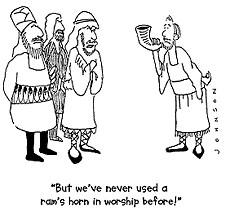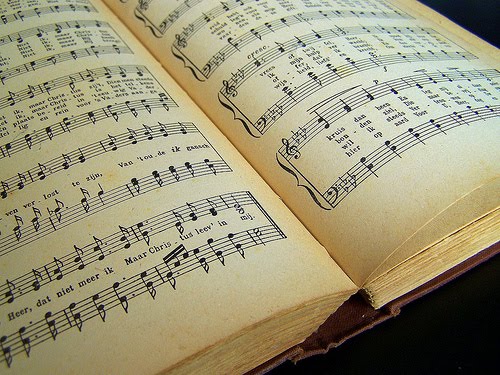Last week I came across this humorous story about an old man’s perspective on praise choruses and a young man’s perspective on hymns. It sounds like a lot of people I know on both sides of the story, so I thought I’d share. Funny how different the same thing can sound to different ears, right?

An old farmer went to the city one weekend and attended the big city church. He came home and his wife asked him how it was.
“Well,” said the farmer. “It was good. They did something different, however. They sang praise choruses instead of hymns.”
“Praise choruses?” asked the wife. “What are those?”
“Oh, they’re okay. They’re sort of like hymns, only different,” said the farmer.
“Well, what’s the difference?” asked the wife.
The farmer said, “Well it’s like this … If I were to say to you, ‘Martha, the cows are in the corn,’ well that would be a hymn. If, on the other hand, I were to say to you, ‘Martha, Martha, Martha, Oh, Martha, MARTHA, MARTHA, the cows, the big cows, the brown cows, the black cows, the white cows, the black and white cows, the COWS, COWS, COWS are in the corn, are in the corn, are in the corn, in the CORN, CORN, CORN, COOOOORRRRRNNNNN,’ then, if I were to repeat the whole thing two or three times, well that would be a praise chorus.”
As luck would have it, the exact same Sunday a young, new Christian from the city church attended the small town church. He came home and his wife asked him how it was.
“Well,” said the young man, “It was good. They did something different, however. They sang hymns instead of regular songs.”
“Hymns?” asked the wife. “What are those?”
“They’re okay. They’re sort of like regular songs, only different,” said the young man.
“Well, what’s the difference?” asked the wife.
The young man said, “Well it’s like this … If I were to say to you, ‘Martha, the cows are in the corn,’ well that would be a regular song. If on the other hand, I were to say to you,
Oh Martha, dear Martha, hear thou my cry
Inclinest thine ear to the words of my mouth.
Turn thou thy whole wondrous ear by and by
To the righteous, glorious truth.
For the way of the animals who can explain
There in their heads is no shadow of sense,
Hearkenest they in God’s sun or his rain
Unless from the mild, tempting corn they are fenced.
Yea those cows in glad bovine, rebellious delight,
Have broke free their shackles, their warm pens eschewed.
Then goaded by minions of darkness and night
They all my mild Chilliwack sweet corn chewed.
So look to that bright shining day by and by,
Where all foul corruptions of earth are reborn
Where no vicious animal makes my soul cry
And I no longer see those foul cows in the corn,
then, if I were to do only verses one, three and four, and change keys on the last verse, well that would be a hymn.”
Do you identify more with the farmer or the young man? When you’re in a service that uses a style different than your preferred one, are you still able to worship? Why or why not? Sound off in the comments 🙂